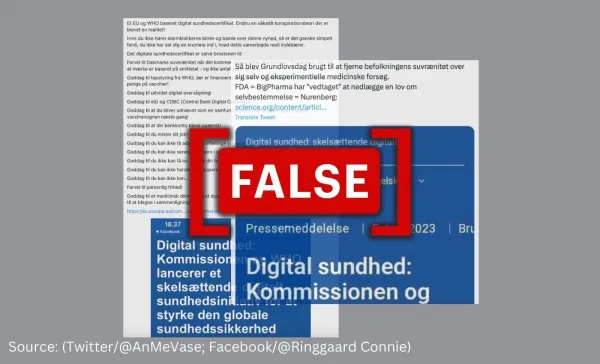By: Nikolaj Kristensen
June 8 2023

The partnership aims to create a voluntary global system of verified health documents to ensure safe and free movement during disease outbreaks
Context
An announcement that the EU Commission and the World Health Organization (WHO) will partner up to create a digital solution for verifying health documents globally has sparked speculation on social media that it could lead to a loss of national sovereignty and limit personal freedoms. However, the initiative seeks to support safe and free movement during disease outbreaks and won't violate state sovereignty.
In Fact
On June 5, 2023, the EU Commission and the WHO announced a partnership on a digital health initiative. The initiative will see the WHO build on the EU's digital COVID-19 certification by creating the Global Digital Health Certification Network (GDHCN). This mechanism seeks to support the verification of health documents and certifications exchanged between member states participating in the network.
GDHCN aims to create a standardized and interoperable system that does not challenge national sovereignty, explains Kelley Lee, professor of health sciences and scientific co-director of the Pacific Institute on Pathogens, Pandemics, and Society. Speaking with Logically Facts, she compared the system to air traffic control: "All countries worldwide agree to certain ways of air traffic control to prevent mid-air crashes, e.g., use of English language, standardized terminology, global system of tracking flights, an interoperable system of sharing digital data, but this does not mean that state sovereignty is violated. This initiative is no different."
Logically Facts contacted the WHO for comment and was directed to an FAQ page regarding the GDHCN. The WHO clearly states that the GDHCN is a voluntary system and that no WHO member state will be forced to participate.
Speaking to the question of limiting personal freedom, Kelley argues that the GDHCN initiative is intended to do quite the opposite: validating health documents across different countries will enable people to travel more freely and with less concern about health issues.
The initiative was spurred by the COVID-19 pandemic that saw countries restrict people's movement to reduce the virus' introduction and spread. "To reduce these risks, many governments required travelers to demonstrate proof of full vaccination and/or negative test results. As this had never needed to be done before, there was no agreed system for doing this. The lack of a system actually hindered free movement of people because different countries required different documentation or they had limited capacity to verify documents, especially hard copies," explains Kelley.
A system similar to the one the WHO is working on was in place within the EU during the COVID-19 pandemic, with several countries outside the EU also connected. The EU established a digital COVID-19 certificate on June 1, 2021. The certificate allowed people to show proof of COVID-19 vaccination, a recent negative test result, or a past COVID-19 infection, making additional COVID-19 tests or quarantine when traveling in the EU obsolete. Other countries outside the EU had similar systems. England, for example, had its own COVID-19 pass through the National Health Service.
The Verdict
The partnership sees the WHO build on the EU's digital COVID-19 certification to create a standardized and interoperable system of validating health documents across different countries, enabling people to travel more freely with less concern about health issues. The system will be voluntary. Therefore, we have marked this claim as false.